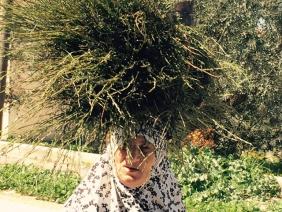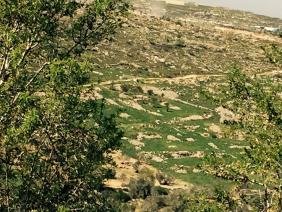Yasuf, Iskaka, Agricultural checkpoints east of Ariel settlement
We returned to these villages, although three of our team had visited them only two weeks ago, because the Council Heads telephoned, asking us to come. They wanted to tell us about the settlers’ harassment and cooperation with the Army.
Teachers in the Girls’ High School complain: settlers appear in Iskaka at all hours, harass them and upset the students’ ability to concentrate.
The teachers in this school told us this was the first time they had ever met Israeli women; they were very pleased.
Two deserted seasonal gates : (1) Iskaka gate near the Eastern entrance to Ariel. The gate did not open at 12.50 pm, as designated by the DCO (according to the table). No Palestinian could be seen in the area. (2) A gate on the path leading from Yasuf to the village’s lands close to the Tapuah settlement. We did not know of its existence, and it is not clear whether/when it is supposed to open.
: (1) Iskaka gate near the Eastern entrance to Ariel. The gate did not open at 12.50 pm, as designated by the DCO (according to the table). No Palestinian could be seen in the area. (2) A gate on the path leading from Yasuf to the village’s lands close to the Tapuah settlement. We did not know of its existence, and it is not clear whether/when it is supposed to open.
10.15 a.m, YASUF

Harassment by settlers and the Army
We arrived at the village, following A.H.’s phone call to Zippi, asking us to come. As soon as we arrived, he told us what had happened on Friday the 26.02, near a park and a spring close to the village. At 6:00 am, two uninvited settlers and a child arrived at this location, which belongs to the village.
In previous visits to the village, we had heard that the Tapuah settlement’s continuing expansion into Tapuach B has evoked great anger. The villagers have appealed to the Supreme Court, requesting that the lands on which Tapuah B is built be returned to them.
On Saturday 27.02, two settlers came to the spring again. This time the Palestinians received them by throwing stones at them, and the two fled to Tapuah B (West). After 10 minutes, the Army arrived and with them some settlers. The soldiers split up into 3 groups: the first guarded the settlers, the second stood near the spring and the third at the entrance to the village. They shot teargas and stun grenades, and fired live rounds. There were no casualties. When the Palestinians returned to the village, the soldiers were free to conduct house searches. A.H. points out that this was the first time the village was confronted by the Army in this way. For years it has imposed sudden closures from time to time. During our meeting, a team from the Palestinian TV arrived to interview the Council Head.
AGRICULTURAL SEASONAL GATE (1), NEAR THE TAPUAH SETTLEMENT

When we asked about the agricultural gates, A.H. said that there is an agricultural checkpoint on the winding path from the village to their lands near the Tapuah settlement. The DCO sometimes opens the gate on days of olive harvesting and of ploughing and planting. He couldn’t give us specific opening times, but thought it opens on Wednesdays and Thursdays.
We went to look for this gate.
When we entered the village, we met near the Council, a group of women, one of whom was a member of the Council. We stood outside talking with them and it turned out that they were going to an activity at the Women’s Club. They mentioned various of the Club’s activities, and we told them of several which we run with women’s clubs in other Palestinian villages. The Head of the Council who participated in this conversation was very enthusiastic, and encouraged us to have such activities in his village also. The women showed interest in learning Hebrew with us, and we asked to learn Arabic with them. We promised to return in some weeks to meet and plan joint activities.
MEETING THE HEADMISTRESS AND TEACHERS AT THE GIRLS’ SECONDARY SCHOOL YASUF—ISKAKA
Our host from Yasuf took us to the school which the two villages share. For the last two weeks it has been closed because the teachers want better working conditions and are on strike. In spite of this, the headmistress and some 5 teachers agreed to meet and talk to us. This was the first time that a headmistress ever agreed to be interviewed without first asking for permission from the Palestinian Education Ministry.
After we introduced ourselves, the teachers told us about the school and the students, and said that this is the first time that they ever met Israeli women. They were very glad that we had met. The headmistress and the other teachers said that the girls come willingly to study, not because it’s a “duty”but because they really want to learn. But sometimes they come to school tired and not focused. This happens after the settlers come to the village, frighten them and don’t let them either sleep, prepare their homework or concentrate on their studies.
About half of the students who finish 12th grade go on to University, mainly at Open University. The village offers ten university study scholarships to outstanding students who excel in the matriculation exams. The teachers with whom we spoke live in Salfit and come every morning to Iskaka to teach. They use public transport or Sherut taxis. They are often late because the Army suddenly closes off the bridge under the road to Ariel.
In an aside, they also said that on that day the Huwwara checkpoint was closed.
ISKAKA
A.K. the Head of the village council said that two weeks ago, after our previous visit, soldiers entered the village and threw tear and stun grenades near the supermarket, and even shot live rounds into the air, so as to frighten people. We asked about the condition of the seasonal gates and he agreed to come with us at the designated time to the Iskaka gate, close to the Eastern entrance to Ariel.
12.40 pm.The ISKAKA SEASONAL GATE (2) is a wide gate made of iron wires which is on the agricultural land of the village. The village is trapped between the security road to Ariel on the SE, and the road leading from Ariel to Road 60, on the East. The agricultural gate is very close to the Eastern entrance gate to Ariel. There is no number or sign on it. Even the heads of the local councils don’t know anything else about it.
When we were already on location, and had not yet come across a single Palestinian, AK told us the gate would be open to farmers this coming Friday. We hope so! As we approached the place, a commercial van stood there and in it two citizens. It seems that we were standing at the security observation point at the entrance to Ariel. When we began to photograph the gate, they tried to photograph us. We turned our backs to them. After some minutes, on our way back along the dirt path, a military jeep with some soldiers appeared in front of us. Apparently
they came at the request of two guards of Ariel. An energetic and threatening staff sergeant investigated us; he wanted to know what we were doing in a security area, a place off bounds to us. We tried to ignore his hostility, and told him we came to see the agricultural checkpoint; attempted to clarify with him whether the gate is supposed to open and if so, when. We didn’t succeed. He also questioned the man who had accompanied us and was traveling in his car in front of us, and we were afraid that because of us (our presence), the staff sergeant would cause problems for him.
While traveling on the dirt path to and from the gate, this Palestinian man called our attention to the accumulating piles of debris which construction workers from Ariel are continuously dumping on both sides of the road.
13.10 p.m. Observing the seasonal gate (1) from afar on Yasuf lands close to Tapuah.
In a conversation with A.H. from Yasuf, he explained to us that there is a seasonal gate on the path winding up the hill from the village till close to Tapuach settlement. The gate is opened by the DCO for only a few days, to plough, plant and to harvest the olives. According to him, the gate is supposed to open on Wednesdays and Thursdays.
At last we saw the gate itself, but only when leaving Yasuf. We stopped by the road, first to observe from afar the path winding northwards towards Tapuach settlement, and then to look for the gate itself. With Nadim’s help we finally succeeded in locating it: a wrought-iron gate, as are most of the checkpoints known to us. And, in spite of its being at a great distance, Zippi also succeeded in photographing it.
